Are The Amish Rude?
In a recent article by Mary Swander, writing for the Iowa Capital Dispatch, she describes receiving an abruptly direct call from someone Amish. I found this of interest because it raises the question of whether the Amish could be described as more rude – or lacking manners – compared with your average Americans. And if so, why that might be. Here’s how it opens:
“What are you doing this afternoon?” a man’s voice came over the line on the telephone.
I didn’t know if I were being harassed or this was someone friendly. He sounded friendly, but a harasser can sound that way, too.
“Who is this?” I asked.
“I’m wondering if you could run me into the doctor in town.”
The field was narrowing. It had to be one of my Amish neighbors. I hadn’t lived in my place, an old Amish school house, for more than a year. I knew some of my neighbors, but not all of them. And I certainly didn’t know them by the sound of their voices.
“Who is this?” I asked again.
“Moses.”
“Oh, Moses. Sure, I’ll run you into town.”
I was stumped by the way the Amish seemed to lack manners. They were a very polite culture, but they didn’t have the niceties I was used to. They never introduced themselves on the phone. They never said “please” or “thank you.” They might finish a conversation by just walking away.
You may have noticed the same thing. That the way Amish communicate tends to be more direct, and with fewer pleasantries. Especially compared to the often over-nice manner of speaking predominant in America today.
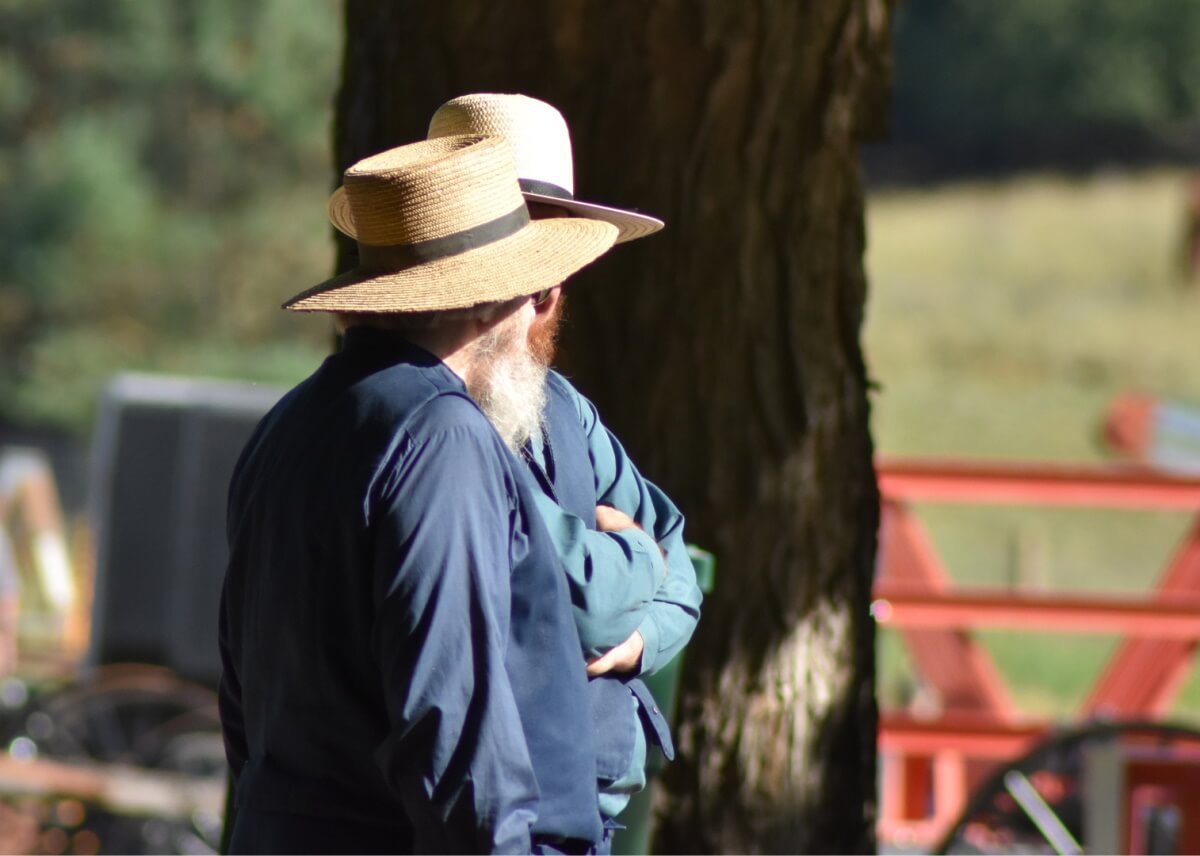
I think Amish are more like some modern European cultures with their more direct and brusque manner. There is less polite packaging around Amish speech. Less small talk to warm up a conversation and more abrupt transitions between topics. And at times you may be left guessing at whether there is more to what’s been said.
Practicality
Assuming the above is accurate, what are some possible reasons for this? (Note: when asking “are the Amish rude?” the usual caveats apply about Amish as individuals, different groups, etc.). Generally speaking, I think Amish are simply more about getting to the point in their communication, as a matter of practicality. Among other reasons this may be in part a function of their family sizes. When you have more people in a family you have more moving parts and more communication that needs to be done. You see this at the Amish dinner table, where there is no “please pass the ketchup.” Rather, it’s just “ketchup”. Whoever’s nearest to the bottle knows they need to shuttle it your way.
Silence
Another part of it may simply be that Amish people are more comfortable with silence, with pauses in discourse. Less of a need to fill in empty spaces in conversation. Silence can easily be interpreted as rudeness, or a lack of manners, and can create discomfort.
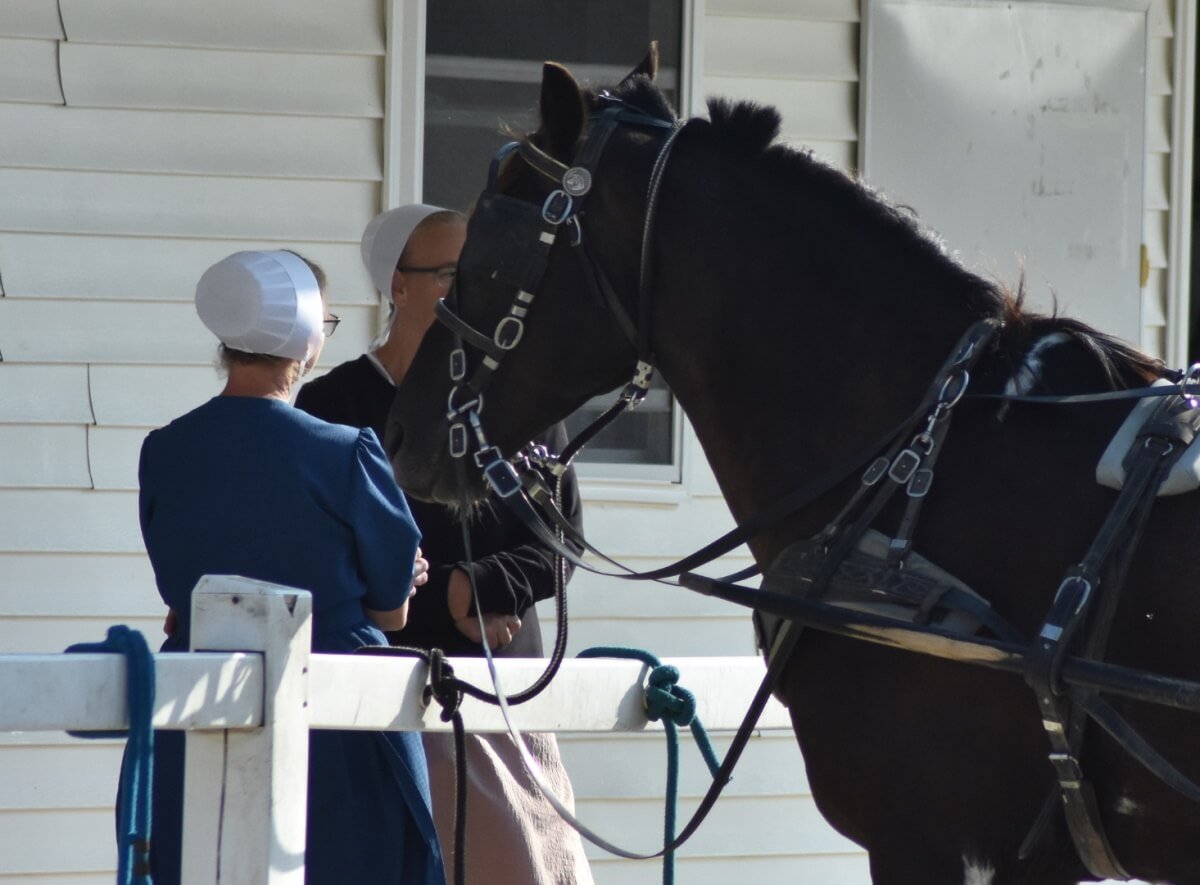
But silence functions differently in an Amish context than in a non-Amish one. In The Amish Way, the authors discuss silence in the Amish context throughout the book. To take one example, “silence exemplifies Gelassenheit – a person’s willingness to accept things without demanding an answer to why they happened the way they did” (p. 156). The also quote John Hostetler describing silence in Amish life as “an active force”, used in a variety of contexts.
Another reason?
Mary Swander looked into the matter and found another reason for what she found to be a lack of manners from her Amish friends and acquaintances. She continues:
Then why did the Amish, a religious society bound together through custom and tradition, skip over manners? At first, my interactions with the Amish seemed curt, abrupt, and a bit disconcerting. Maybe they didn’t have words for please and thank you in their German dialect, and so the sentiment didn’t translate into English. Maybe they weren’t sure about me. A single English woman. Maybe they didn’t want to interact with me. But I hadn’t contacted them. They’d called me from one of their phone shacks in the middle of a cornfield. Maybe they just wanted to do business and not socialize at all.
These interactions remained a mystery. I still took their calls and gradually got better at recognizing their voices. But they continued to speak without identifying themselves and seemed happy to let me guess.
Then I did some research about their linguistic patterns and found that the Amish cut out the niceties in their speech for a reason. They thought that manners were an elitist construct. The use of such phrases as “please” and “thank you” would make them sound like the upper class, a class that was on a higher social rung than others, and one that might condescend to others.
I think there is something to this explanation, as Amish especially in prior eras have been sensitive to the ways of the world and “faster” groups around them. Rejecting the cultural trappings of one group is one way of establishing identity and laying down markers. You see this in clothing and hairstyles and other lifestyle indicators. It would make sense that it would apply to manners of speaking as well.
Changes over time
Now I also think that the manner of communication for some Amish has changed over time. And again this traces back to the big change that’s unfolded over the last several decades – adoption of a small-business focus and entrepreneurial ways that have drawn Amish into closer communication with English people. This leads to them taking on more of their ways, including their manners of speaking.

For example, I can picture some very polite and engaging Amish people that I’ve met and gotten to know over the years. A number of them work in businesses dealing with the public. They use “English” phrases at times and have no problem making small talk. But the way they have learned to speak with potential customers and English friends may differ from how they communicate in their own circles.
What do you think? Are Amish people more “rude” than typical Americans?


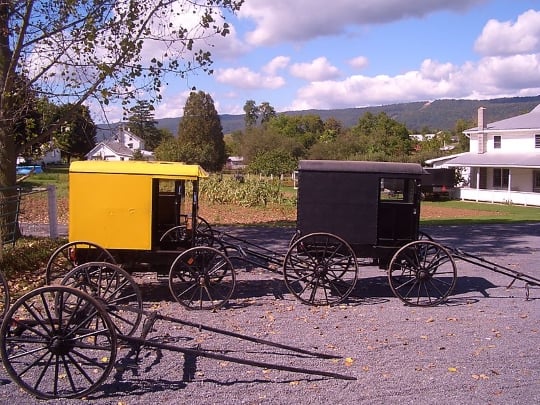


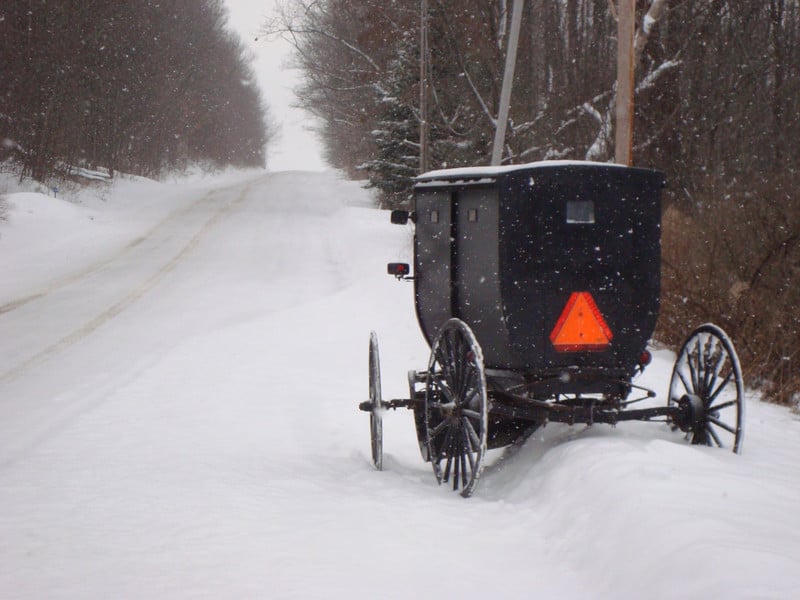

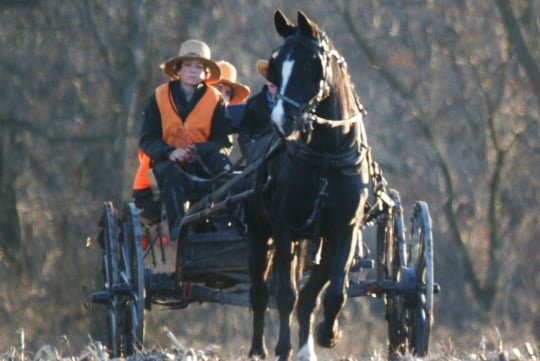
Earthy
I just think they’re more ‘earthy’ and less fake than us “English” are. We are all members of a ‘fallen’ race. That’s real. I mean humans are full of nasty things. All humans. Every human. They just don’t hide it like we do. It’s jarring because of our own dishonesty. But I like people who are ‘plain spoken’ so I like the Amish. You know where you stand with them. 🙂
Loved this post...
And found that I have shared many of the same experiences as the other English folks with my Amish friends: no please or thank you, comfortable with long periods of silence, etc. Thanks for the insightful explanation.
Glad you liked it Ellen. Some really good comments on this post.
Amish I know are not rude
Hi, I am a tax professional of some 30 years I am semi-retired and live in rural Minnesota. I have 7 Amish families I do tax returns for. Everyone of them are polite and kind, always thank me, always say who theyEW when they call but I have gotten to know them well enough that I know their voices but they always say who they are. The women are shy at first but never rude, in fact they are always grateful. But I am easy to get along with and appreciate their culture. I am me and they are themselves. Mutual respect. MY husband and I are watching a movie right now about Amish and the producers are portraying some of the females as being rude and downright witchy and that is totally not fair. These neighbors here are Old Order Amish, so maybe there are other sects that may come across rude??
Respectfully, Linda
Amish
Hi I have lived in an Amish Community here in Glen NY. Matter of fact they are Old Order Amish, I have never really thought them rude. I know most of their voices now and their families. I have eaten next to them, side by side. They are in my life everyday…I guess it ‘s something that is a learned behavior. I do speak some Amish but never listen to their conversations. Im learning it by myself. I couldnt have asked for better neighbors..
Older Farmers
Some older folks I know in farming families, not Amish, communicate that way, particularly on the phone, but also face to face.
Rudeness
I deal in business with several Amish and while some are a little standoffish, the Swartzentruber sect is the one I noticed seemed the most rude. At first I thought it was just me, I was being polite and they would finish the conversation and just walk away. As I found out, manners are not really taught to them at all. I’m not bothered by it anymore. I avoid please and thank yous and just tell them the work looks good.
"rude"
if someone feels that they have/had a “rude” experience, they have the choice to either continue or discontinue future “rude” experiences by not placing themselves in that environment again. i think this is called “common sense.”
Standoffish or Just Quiet?
As in introvert, I’ve been accused of being “standoffish,” which is far from the truth. I’m just quiet. Be careful how you judge people.
Not rude at all
Being German (not Amish), I have no issue with their communication style at all. I remember an incident where I admired the Amish woman, and still do, actually. It was fall, there were potted mums for sale, set up outside the store. An “English” visitor wanted a discount and called out the Amish woman who worked the cash register. No discount was forthcoming. English woman demanded to speak to the manager. Amish woman said very little and went back to her cash register. That’s where the story ended. No manager, no discount, no one making a scene. English woman stood there, puzzled, and eventually left. Perfectly handled.
A LOT OF GERMANS ARE LIKE THAT. I DON’T FIND THEM TO BE RUDE.
Well done. Though strange to demand a discount unless there is some other detail suggesting why a person would feel entitled to one.
It was the end of the season and the selection was not as plentiful as it had been earlier. But the plants were fine. To me, I either pay the price that’s asked, or I walk away. The only way I would have asked for a discount would be if i had taken all the mums.
She fixed situation!
I love that way of handling what I consider a pushy customer without any confrontation. Sublime.
The biggest issue
The most telling clue is that Mary Swander, as she states, is a single female. As the men are mostly the one’s who take of business dealings, talking to a single female would be in most cases, frowned upon. And exchanging pleasantries as such would be very improper. Even at gatherings, the men and women don’t socialize together and tend to stay with their own groups.
Good point that adds another layer to this.
I continue to learn from my Amish neighbors
We have become very good friends with our Amish neighbors. As we spend time together I have noticed some of the points made in the article. At the dinner table, little Anna says, “spoon” and I get her a spoon, Arron says, “ketchup”, and I pass the ketchup. They are not being rude, its how they interact at their dinner able. What I have noticed is just like we learn about them and their ways, they also learn about ours and we both make changes out of respect for each other. I am a better person as a result of being friends with this beautiful family.
Can be seen that way
Our Amish friends of 20 years can certainly come off as rude, especially if you are not used to their ways. They do not mean to be considered rude, and I bet if you brought it up, they would not realize they were being considered that way. It is such a different culture that we on the outside really need to take them with a grain of salt until we understand better why they are the way they are. After all this time, and as close as our friendship is, I would still have to say they are just different.
Well put.
Not rude, just different
We moved to northern Indiana 3 years ago and encounter many Amish each week. The one striking difference that we have noticed is how they shake hands. It is a quick once up and down and then a release. There is no grip involved, such as a firm handshake the way English are taught. I’ve gotten used to it, and understand it is normal for them. I don’t take them for being rude at all.
I recognize that shake! Though I wouldn’t have been able to pinpoint it to northern Indiana specifically. Might be the way of things in other places too. It’s kind of a get-to-the-point-and-get-on-with-it shake 🙂
Are The Amish Rude?
That question is “rude.”The Amish are obviously different than other people. But to base that question, or opinion on one interaction or even several is not fair. There are many cultures that are different than us and many that consider Americans rude, loud, and overly opinionated. That said, a caller should always identify themselves first. But maybe that particular person has a condition, Aspergers? that may contribute to social interaction difficulties.
Another Question
The real question seems to be, “Were the Amish ‘rude’ on purpose?” It there was no attempt to be rude, then it seems like it was a miscommunication or misinterpretation. Here’s another question: “Are ‘the Amish’ suspicious of the English?”
are the Amish rude?
They are not rude! They speak directly. This saves everyone time. Many Amish workers in the markets do small talk with their customers. I think they would be shocked that anyone thinks they are rude. I believe that we are lacking to think this of a different culture, possibly even discriminatory!
Rude and short tempered.
On a good day, my Amish experiences are positive and profitable. When things aren’t going well, watch out. Catch them lying, and they will get awful mad in a hurry, in an attempt to intimidate you. Make them honor an agreement, and they will pout like a child. I’ve seen them bully people, lie straight to their face and go back on agreements both written and verbal. Anger is a real problem with some middle aged men, and I’ll go toe to toe with them. When I point out a quality issue on a job, they won’t take responsibility but will say, all construction is flawed, and you have to accept that. To which my answer is “no, you have to fix that”. So are they rude? My answer is YES. Some are, and they only get one chance after I bring it to their attention. I’ve fired many Amish contractors for all sorts of reasons. Being a jerk is certainly one of them.
So on a good day, we write stuff down, agree to a price, they don’t “forget” to pay for my services and we all make money. Most problems I’ve encountered surrounds money or time, but like all societies, there are good and bad actors. Some have better communication skills than others. What you will most likely regret with any Amish man is what they don’t tell you. Ask and ask some more, then write it all down and never pay up front. Some Amish are terrible business men, and terrible craftsmen, remember that.
This is interesting firsthand experience, and good general truths about people, Amish not excepted, in general. Can I ask (*if* you’re okay sharing) which community this is?
I have learned over the years that for some Amish folks it is a sport to pull a fast one on the English. Since I can speak German with them, I am not considered “English” and some of them told me about it outright.
The PA Dutch markets are a good example and one of the types of businesses I had in mind in particular. One Amish friend who ran a stand for a long time was well aware that part of why people came in to their market rather than a grocery store was for the interaction and relationship.
Rude
One thing that I will say about Hutterites and Amish is that they tend to be blunt, to the point where people who are used to a culture where you have to pad everything so you dont offend may find them abrasive. That isn’t necessarily a bad thing, at least they still feel free to speak their mind.
The older I get the more I appreciate direct/blunt communication, even if it comes off as impolite. It’s more honest and better to know what someone actually thinks. As opposed to niceties and indirect communication which can leave the other person’s true thoughts obscured.
Behavior is LEARNED
I have several Amish neighbors, the closest has ten kids. I model table manners when we dine together. (I take them out to lunch when we go on shopping trips out of town). I model politeness, “please and thank you” opening doors and so on… just as I do within my own family. The females pick up on it much better than the males. I model “gentle” not gruff.
The family operates a small store on their property, selling baked goods, eggs and so on; I’ve share with them that the tip jar will get greater contributions with a “hi” and a smile.
JP
That’s interesting, have you noticed if they are picking up any things based on your interactions with them?
Rude?
That’s interesting. Except for some who work with the public at their stores, who have learned all these niceties, this is true. They are super direct and don’t say please, thank you, etc. I was trying to pinpoint what was “off” about their manner and this is it. Just different, more direct. I hadn’t really thought of it as rude though I probably would if someone called me and asked for a ride without saying something like “I’d appreciate it” or “Thank you” once I said yes.
Worldly separation
One thing that i was taught was the Amish prefer to stay away from Worldly or possibly Sinful influences. So people they haven’t known long enough to trust very well or people that simply dress inappropriately tend to embarrass them. It will take a lot of time to let them know you are a devout Christian like them and let them determine if you are genuine. Don’t even try to fool them if you aren’t because their powers of Discernment are strong and well taught even to the very young. Just be yourself and be respectful even when they may seem cold and unfriendly. It’s just them being cautious.
Very true
Good advice!
No.
I come from a German background and I know that the culture over there is like that; they tend to be very blunt, direct, and to the point. The Amish have their own cultural style and to them it is not rude. It is short and practical and they don’t need all the cushions inbetween. I also have no problem with silence, sometimes even a talkative person like me just doesn’t have much to say. Sometimes people seem uncomfortable then but it is just because they don’t know me enough so they are wondering what the reason is. Now when it comes to this particular conversation, I did not find it rude, it was just more direct without the formalities we are used to. But, I also found it funny that the person receiving the call was interpreting their attitude by some of the people in the US culture who are not particularly nice, and that was the problem, quite the opposite from people in our culture making the Amish look rude, ironically. We must look past the mannerisms and at the intent. They may not have been raised with all the ‘courtesies’ in what we call polite society, but it is the underlying attitude that matters. It is hard to determine this unless you have been around them more and know them better.
When I made the comparison to European cultures I had to stop and think about it and of course European countries can vary (considering stereotypes like the Dutch are friendly, the English polite to a fault, etc). The peculiar thing is that in some cultures they use quite polite wording, but coupled with a more direct and sometimes impolite-feeling manner. I’m thinking for example of Polish where they use “Pan” and “Pani” (something like “sir” and “ma’am”) as a rule with people that aren’t close. It would be considered generally rude to immediately go to the personal “you” with a stranger, and certainly with one who is older. This can vary of course by the age of the interactors, social status, etc.
Are the Amish Rude?
Yea, very much so! I’ve been driving for them since 2013. I now refuse to drive for any except the small community near me. I’ve had Amish shut doors in my face. Push me aside so they can enter a building 1st. Cut in line at a refreshment site. And it’s not just the young. The older men are horrible. I now refuse to go to an Amish function that is held indoors. I love auctions but I will not go to any where the auction is indoors. I have no problems at weddings, etc, since I’m not invited.
Yikes, that sounds downright unpleasant. As Joseph Frey noted on this thread, some of that might have to do with their perception of you as a woman. I’m always curious which communities people are referring to, if you care to share.
Tv
Um I ‘d say it sure varies from community to community. I know some totally polite Amish and some that were rude! Just the same as some English are rude and some aren’t.
SB
Not rude
I don’t know any amish directly but I wouldn’t consider them rude if they ask for something direct without thankyou. Maybe they don’t address themselves on the phone as who they are because they may be intimated to talk on phone. You know what Italians are like at a dinner table. LOL. Most time they don’t ask they just reach over you to get what they want and all talk at same time lol. I know because I grew up in Italian and American or English way and I see the difference. But neither are rude it’s just their way or culture. I believe from learning they are respectful people.
I do like the Italian comparison even though the Amish don’t feel much at all “Italian” to me 🙂 Bu point well made about culture. I have limited experience with Italian culture but based on what I do know it seems like a culture where people aren’t afraid to share and you are not confused about how they are thinking. Compare that to say Estonians who can be a lot harder to discern
How very insulting, rude and lacking in knowledge. Your stereotypical Italian comments are so off base. I am a 73 year old woman
of Italian heritage. My Mother impressed
upon us the importance of proper etiquette if we wished to succeed in this
world. I come from a large family of Italian heritage and have many friends with an
Italian background. We are American just like you. Your comments speak to when Italians rolled off the boat , at Ellis Island, 100+ years ago. What is your background that makes you an
authority on Italian culture? I also found many of those commenting on
Amish rudeness off base. Different cultural groups have different ways
of communicating. Either accept their differences or don’t engage. Some of you need to look in the mirror!
I respectfully disagree. The comments about Italians were simply that they were direct, and not in a way intended to be rude. Virtually every comment on this thread affirms that the Amish, like some other cultures, are not rude, but different. They have cultural reasons they are as they are, and none of them are intentions to be disrespectful. You seem to have found rudeness despite the commenter making a point not to be rude.
Expecting others to do things for you that you can do but won't, is rude
Assuming other people will run you around when you’re perfectly capable to get a driver’s license and car but refuse to, is rude. Calling to bother someone to do so, is rude. Call an actual taxi or van service. Just because your neighbor has a car doesn’t mean they’re your personal taxi and just because they have a phone doesn’t mean they’re available to take calls to impose on them for a ride. God is not going to send a lightning bolt to kill someone because they drove a car, they can and should do their own driving instead of this silliness about not driving cars but being passengers. Also refusing to educate their kids beyond a certain point but availing themselves of the services of the educated. The Amish could easily drive, and could produce from among their many kids a few of their own doctors etc. Apparently they’re worried for their own souls if they touched a car steering wheel or developed a higher level skillset but they’re not concerned about the souls of those they pay to do it for them. Refusing to do something for yourself you are more than capable of doing because you prefer to make others do it for you, is rude.
Ummmm…wow.
Agree
If that’s a serious comment, it’s sadly a lack of understanding and a lack of tolerance of the right of others to make choices. It may be a troll just trying to stir up argument.
reply to GJ
The Old Order Amish do not own cars, and as a rule do not have driver’s licenses. That is just part of their religious culture. They do, very willingly, pay the English to provide them with taxi services. They don’t just call up random people and ask for favors. They call people that they already have a relationship with.
My brother is retired. He lives in Lancaster County, PA., the heart of Amish country. Surprisingly, there are Amish there that play golf. He has taken several small groups, in his car, an hour each way, to play golf. He has things to do in the destination community while they play. At the end of their play, he hauls them home.
reply
in my experience being in wisconsin and driving for an amish family they are not rude to me if they were id leave and go back to virginia
Word and just words
Two words that are often applied to the Amish are “plain” and “simple.” So I find it a bit baffling that we’d expect their communication to be anything different. I’ll admit this comparison is a bit “over the top,” but if an Amishman wants his horse to stop, he probably says, “Whoa!” I don’t think he says, “Please stop!” Those who rush to judge and label the Amish might well be labeled rude. Expecting these plain and simple people to act and think the way we do demonstrates intolerance–and, as a few comments demonstrate, that intolerance is often stated arrogantly and rudely. I suspect the Amish would say something like, “the words don’t matter but what’s in your heart does.”
Are the Amish Rude?
A couple of things happened at craft shows.
I was shocked when a group of Amish ladies pushed past me to get to the sale.
Another group of Shwarztentrubers had a booth, selling. (The man was playing on an iPad the whole time!). Their teenage daughter was running the show. She offered no directions on making any of the crafts they offered to get people in their booth. No greetings, no smiles.
This post helps me understand a little better their behavior.
The mother had two little ones who were extremely well behaved during the entire weekend. Quite a contrast to most ‘English’ children of that tender age I have seen.
Amish children – generally – will tend to be reserved around outsiders, and more so in the plainer groups. And sounds like those ladies were highly motivated, hope you didn’t catch any elbows at least! The Swartzentruber guy on the iPad is another eye-catcher. I assume that was borrowed from someone English at the show.
Shocked
I wonder if we are not as surprised when English folks are rude, that we expect different from the Amish because of cultural stereotypes.
Amish rudeness
Amish are human beings just like the English – we’re all different! One slight difference being their habit of telling the truth. Think about it! Most English tell little white lies so as not to do what they feel might hurt other’s feelings. If asked a question, most Amish will give an honest answer, while, once again, English, for the most part don’t like to hurt the feelings of others, so they lie. Candor with the English is not considered a virtue. The Amish with whom I’m acquainted treat me as their equal, just as I treat them as mine. I guess that’s why I get along with all my Amish friends
I clicked the link to the article by Mary Swander referred to in this post. It is interesting to read her whole story. She sought out to answer her own question, “..why did the Amish, a religious sect bound together through custom and tradition, skip over manners?”. She set out to do some research on this matter, and learned about linguistic patterns of some Native Americans, and Quakers, as well as the Amish. Her conclusion was, “The Indigenous, the Amish, and the Quakers — all are more egalitarian groups than the mainstream, hyper-competitive society that puts such stock in those words ‘thank you'”. I appreciate the last paragraph of her article:
“Now, I’m surprised when the Amish do identify themselves on the phone. And there is no need, really. After 30 years of living in this community, I know most of my neighbors and the sound of their voices. We don’t need to dance around in our conversations. I know they are grateful for a ride to the doctor. I’m grateful I can help. I’m grateful to have them as my neighbors. There’s no need to say Migwech.” (In her article, she earlier explained that ‘Migwech’ is an Ojibwe word for ‘thank you’).
Thanks for adding that Al, good additional piece of the story. I encourage people to check out the full article. I kind of got the sense that she wasn’t actually offended by the direct call, especially given her experience there, but used the anecdote as a way to thoughtfully delve into how we interact in a revealing way.
Are the English Rude?
The post seems confined to asking whetheer the Amish are rude to the English, between cultures. A related post that might give rise to good discussion could be, “Are the English rude to the Amish?” Crossing cultures in the opposite direction likely sometimes encompassees that which could be considered rude by the Amish, particularly when English tourists treat them as though they and their unique culture are on display.
Also…are the Amish rude to Amish? are the English rude to English?
Rude
APPLAUSE!!! Applause!!!
What a great thread. Thank you all.
I also had the question in mind…are the English rude to the Amish?
I grew up in a VERY strict German family. The way I was raised, we considered it rude to ask questions of ANY strangers. That was being too forward.
My fathers parents house was always ice cold…in more ways than one. Never lights on, Candy offered. Never a Christmas card or presents. Us children were to be seen, not heard. Our we had to sit on the sofa, back straight & hands folded in our laps. It was good training for Catholic school.
When I went to public high school I was laughed at for raising my hand, rising from my seat, & answering a question with a full sentence. I was quiet & considered aloof, stuck up…& RUDE for not dealing with typical teenage nonsense. I was very active in drama class, writing, & public service organizations. It all bode well in business…not so much for relationships as the world seems to want to be loud & boistrous…which I considered RUDE.
On the other hand, my mom & I were best friends & we would laugh ourselves silly. Humor helped with the balance, though my brand of humor…laughing mostly at myself, people just didn’t get.
My dad taught me the wonders of nature & we often went on walks through the Hocking Hills of southern Ohio. When other walkers disrespected the trails by trampling where they shouldn’t, laughing & carrying on & littering…they were being RUDE in church.
What someone’s definition of rude is depends on what you were taught. I was married to an Italian & his family didn’t understand my quiet ways at all. I thought I was being respectful. They thought I was being disrespectful.
All in the eye of the beholder. Just don’t judge anyone too harshly for being different from you.
I applaud you! You grew up similar to how I did, and got misunderstood as I did as well! Manners and respect mean a lot. Yet so much is in the interpretation. The key is to communicate your backgrounds and understand each other.
Birds
Why do you bother people?
WHAT I HAVE NOTICED
I have seen many times when certain Amish would not take no for an answer as when they want you to drive them and you had other plans. One thing I really despise is when you tell them that you must leave at a certain time so you can be at another scheduled place to pick up someone else and they make you late due to not keeping their word. This is not always the case but it is done sometimes. When this occurs my boss never schedules them again.
Telephone Usage
I don’t think most Amish have used a phone enough to know how to do it very well. One would think that it doesn’t take much to use a phone properly, but the “English” have been doing it all their lives while the Amish just use one once in a while. I think that more are using cell phones now so that probably changes things. We need to remember that they have a different culture than main stream America, and it influences everything they do.
Are the Amish rude?
Certainly not by any intent. The Amish culture is very hard working, of necessity, and tight knit, and supportive of each other. The hard working is a function of both financial necessity, and the Biblical admonishment to be productive, as contrasted to lazy. In the historic context of small farmers, which they were, primarily, as almost everybody was at one time, everybody in the family worked, starting at a very, very young age. Communication was largely within the family unit. Add to that, the social hierarchy was very paternalistic. God / the Bible is the ultimate authority, then the father, who is the followed by the wife. And the children are to obey all authorities. With this construct, and the need for the work flow to be efficient, minimal communication was necessary.
Then there are the Biblical principles of honesty and truthfulness, which the Amish adhere to very strictly. Combine that with the Biblical principles of fairness, equality, charity, and supporting each other with in the Christian community*.
The broader social constructs of pleasantries are designed, purely, and historically, to curry favor with people in authority. This is necessary, as to not be pleasant, even to the point of obsequiousness, could cause friction in legal and social interactions, which can cause avoidable problems. Individuals in the broader society, individually, can lack any and even all of the aforementioned positive personal traits.
One need only to read legal documents from 17th and 18th century Europe, which was still operating in the period of serfdom and authoritarian royalty, to see how important the fawning, obsequious pleading, of necessity, were.
In the context of, until recent years, almost all Amish communication was face to face within homes and within the broader Amish community. Each person was already personally familiar each person that they communicate with. To that, add the context of the Biblical principles mentioned earlier. Thus, direct, to the point communication was all that their society needed. And, importantly, the Amish religious belief system suppresses ALL of the negative personal characteristics that cause friction in the general society.
* Note, that charity extends to the whole Amish (the Christian) community, which will help, for example, in constructing each other’s barns. Or in cases of tragedies, the whole community will cooperate to alleviate the tragedy. If someone’s spouse dies, then typically another individual who is the gender of the deceased, who is without a spouse will marry the surviving spouse, thus providing them financial support and companionship.
This is why the Amish, at least historically, did not have any form of insurance. To do so would have been worldly, instead of relying on the Christian charity that they believed each of them is obligated to provide to each other.
I would say, for one they are not use to talking on the phone, and for 2 their time is very important to them as they do so much work..They don’t dilly dally. They are down to earth..
It's all relative
This is a very interesting discussion. What is “polite” or “rude” is subjective, dependent on many factors, cultural and situational. Even expressions such as “please” and “thank you,” which we would normally think of as always expressing politeness, can be used in less-than-polite ways (e.g., “Thank you for not smoking”). It all depends on the context.
An important aspect of Amish society that observers have noted is its “face-to-face”, familiar character. This is reflected in the everyday language most Amish use among themselves, Pennsylvania Dutch. There is a word for “thank you” (denki), but none for “please”. There are no titles, e.g., “Mr.”, “Mrs.”, “Rev.”, etc., and, unlike in German (the language with which it is most closely related ) there is only one word for “you”. (Folks who know German, Spanish, French, and other languages know that you have to use either an informal or a formal pronoun.) There is also no direct translation of “I love you” in PA Dutch. Obviously, Plain people feel love for others. They just prefer to let their actions express that emotion rather than their words. (Consider how casually English speakers use the word “love” … “I just love shoofly pie” … Really? As much as your kids?)
I was once assisting an Amish man in court who addressed the judge as “Michael”. Was that rude? I’d say not, since the Amish man meant no disrespect at all. He had never been in a courtroom before and saw the judge’s full name on n the bench. (The judge also did not feel insulted and smiled in a friendly way.)
Speaking now of the article by Mary Swander, Amish phone etiquette is different from how many other Americans speak when calling someone up. I’m pretty confident that the man who was asking for a ride assumed that Mary would know who he was and was not intending to be rude or disrespectful. Just the opposite, his lack of formality with her likely suggested a tone of friendly familiarity. Her reaction, though, is understandable.
Many years ago I saw a copy of the classic self-help book, “How to Win Friends and Influence People” in a bookstore catering to Plain people. I had always assumed it was manual for slick salesmen, but in fact most of the principles it teaches are in line with Plain humility, e.g., “The only way to get the best of an argument is to avoid it” and “Show respect for the other person’s opinions. Never say, ‘You’re wrong.'” On balance, I’d say that most Plain people strive to be friendly and considerate of others, even if the way they use English might not always come off that way to non-Plain folks.
Rudeness?
Just as it is in our “English” world, there are rude people, but primarily I have found the Amish to be kinder than we are overall. Their language may be different, but the majority of Amish I have met are quite kind, you just need to get to know them.
A good article / personal space
Thank you for this article! It does help to understand. I go to sales regularly where the Amish are very present, if not mostly running the show. I find them reserved, but usually not rude. Yet there are exceptions.
One of the biggest things I notice is about not leaving space for other people. Groups of Amish ladies tend to form a circle to socialize right where food lines are, making people think they’re in line, though they aren’t. If there’s a similar busy area where people are shoehorned into a tight area, they will stand right in the middle and block the flow.
If you’re outdoors in open space, and someone Amish is coming from the opposite direction to pass by you, they often almost run into you, despite wide open space. There is no anticipating the path people are walking in, much of the time. The little Amish boys that haul with their little wagons will come right at you and park it directly in your path. At one sale, I got hit in the shins two or three times by those wagons. I’ve often wondered if it’s just something they see as not worth thinking about, to keep things simple– everyone go where you want, no foul, no harm if toes get stepped on. Reading the commenters’ many observations make me think maybe that’s how it is. Places to go, work to do. Stay out of the way. Laugh it off, if you collide.
Really great!!
I think it’s fascinating how cultural differences can sometimes be mistaken for rudeness. The Amish community’s values emphasize simplicity and privacy, which might come off as aloof to some. It’s important to understand and respect diverse perspectives!
Amish? Rude? Yes!
I also live in the heart of the Amish county in Lancaster. Unequivocally, 90% or more of my interactions with Amish folk prove the point. Whether it is an exchange at the local big markets like the Green Dragon or Roots, Amish sellers can be incredibly mean. I stopped purchasing from some vendors…pies with little to no fruit, shorted in change, very unpleasant experience. No once, but consistently. Amish contractors are hit or miss. Some of them do a very nice job; others, not so much. Leaving the job site dirty with trash, materials they use as well as from their lunch. When going to the local supermarket, I sometimes encounter ladies shopping. You better protect your cart. If the cart gets hit, don’t expect an apology. A simple “oops! Sorry!” is the norm. Not with the Amish. Since living here among the gorgeous farms and markets, I have read quite a bit about their philosophy and culture. To each, their own.
Valuing Differences
My experience in Lancaster County seems to be a bit different than other comments. I find the Amish women I met to excessively polite and humble, thanking me repeatedly for rides to the grocery store or for items I purchased that were difficult for them to find. “I am not worthy,” is often the response I receive when doing a good deed for an Amish women. Their husbands are equally grateful. The vast majority of Amish men I met are polite and enjoy a good ribbing now and then. I know an Amish man who worked at a tourist heavy farmers market, and was clearly weary of the hundreds of questions posed to him about the Amish. “We like to rub our beards with manure,” he assured one customer, chuckling to himself. If that customer only met that one Amish man, she would assume Amish men were rude. And he was rude. But we need to be careful about stereotyping an entire community from our limited interactions. Being mindful of how we present ourselves in the Amish community will often shape their responses to us. Author of IN PLAIN VIEW: THE DAILY LIVES OF AMISH WOMEN (Herald Press)